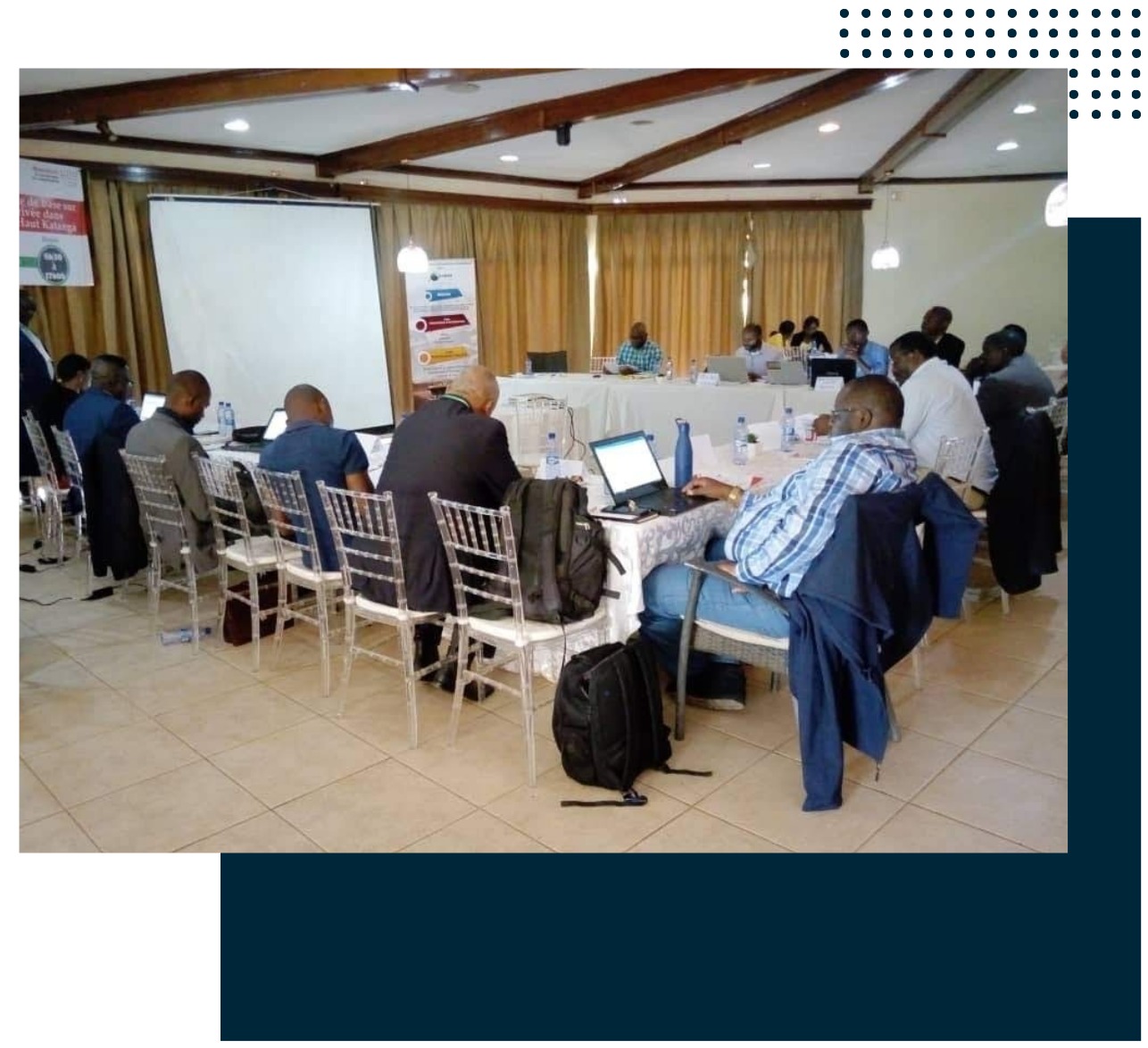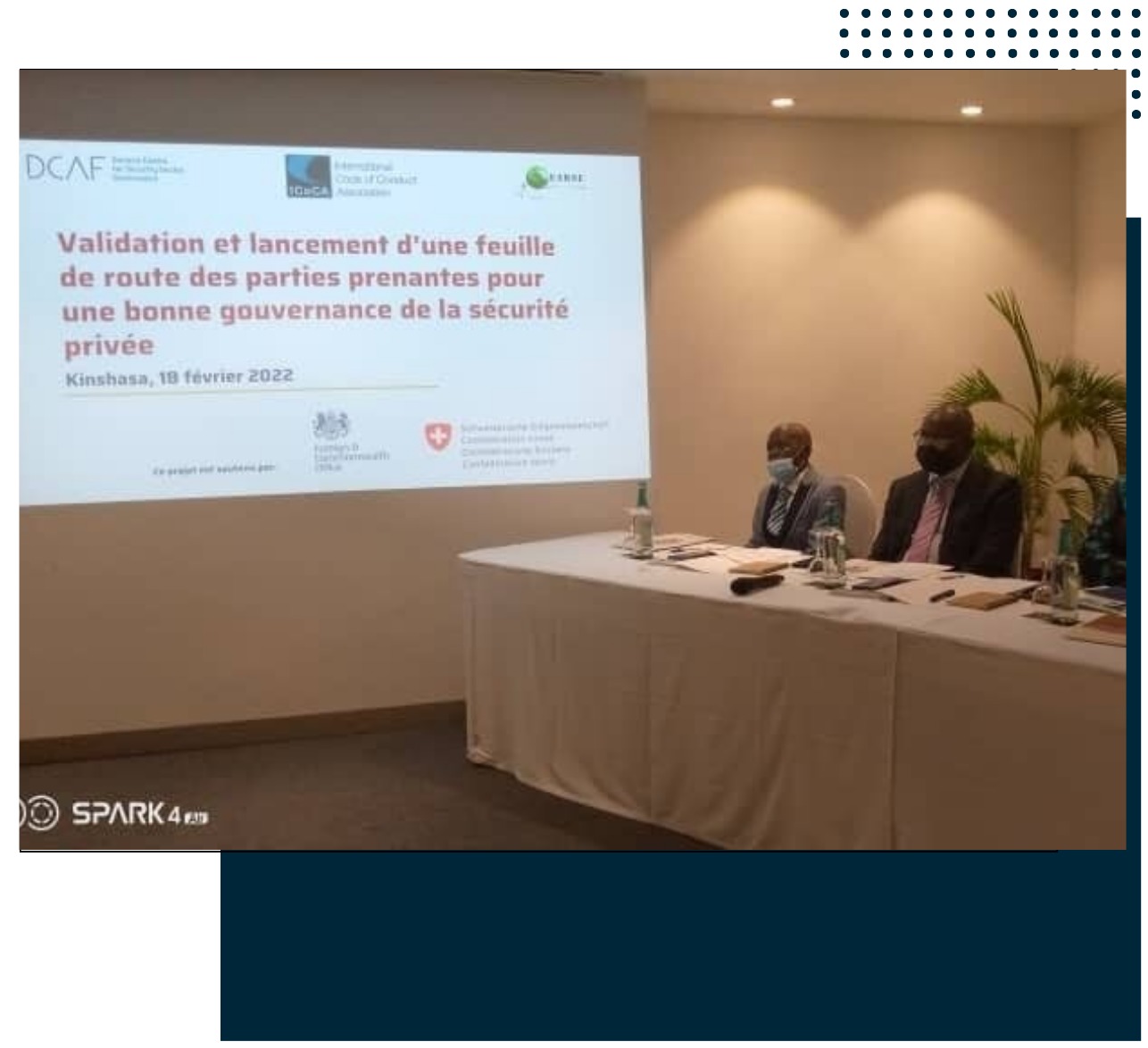OEARSE – CSO PROFILE
OEARSE: A Comprehensive Four-Pronged Approach to Documentation, Advocacy and Monitoring of Human Rights in DRC
ICoCA CSO Member since January 2020
Addressing Transparency, Equality and Governance in the DRC and Internationally
Since its establishment in 2011, the Observatoire d’Etudes et d’Appui à la Responsabilité Sociale et Environnementale (OEARSE) has been dedicated to improving the governance and exploitation of natural resources in the Democratic Republic of the Congo (DRC). With a staff consisting of seven permanent members and several volunteers, the close-knit, dedicated team advocates for the socioeconomic development of healthy living environments for affected communities and minorities.
Headquartered in the province of Haut Katanga, with representation in the DRC’s capital, Kinshasa, OEARSE strategically channels its efforts into four main areas: research, capacity building, advocacy and monitoring. This four-pronged approach to protecting human rights has played a pivotal role in OEARSE’s progress within the DRC.
In practical terms, implementing this approach involves a multifaceted strategy to campaign for the fair exploitation of natural resources by both the Congolese state and multinational companies. OEARSE encourages accountability by monitoring activities such as mining, forestry and hydrocarbon extraction across the DRC. Additionally, the organisation actively promotes the social, economic and cultural rights of minority groups, including women and indigenous peoples, to inspire responsible management of natural resources. Addressing overarching issues like transparency, equality and governance on an international scale, OEARSE diligently navigates these challenges daily. 
A Shared Commitment to Promoting Accountability and Human Rights Protection
OEARSE’s Executive Secretary, Freddy Kasongo, states that they joined ICoCA to become “part of a large family of action”. This strategic partnership is founded on shared core values between OEARSE and ICoCA, reflecting a strong desire to integrate the best practices and standards within the private security industry.
OEARSE’s membership in ICoCA underscores its unwavering commitment to delivering the highest quality services while advocating for minority groups. The protection of international human rights and responsible global resource governance remain at the forefront of OEARSE’s mission. Many future opportunities for development and collaboration are anticipated as the partnership continues to flourish.
Developing a Fruitful Partnership
OEARSE collaborated with ICoCA and the Geneva Centre for Security Sector Governance (DCAF) on several projects, further strengthening their partnership.
The launch of the Study on the Private Security Industry in the DRC: Analysis of the Provinces of Katanga and Lualaba on 7 October 2019 marked the initiation of numerous joint initiatives. This study served as a foundational analysis of the legal framework and the role of service providers in the DRC’s private security industry. It also identified challenges faced by private security actors in addressing human rights issues through responsible action, encouraging stakeholder engagement and exploring new entry points for civil society organisations.
In Kinshasa, on 18 February 2022, a roadmap was established to enhance the governance and regulation of private security in the DRC. The ultimate goal is to improve the spirit of democracy, the rule of law, and respect for human rights within the governance of the DRC’s private security industry. This roadmap serves as a reference tool to guide stakeholders in improving security governance, both generally and specifically within the private security sector.
 Additionally, the development of an online training course on the international conduct of private security companies (PSCs) serves as a capacity-building tool for clients and stakeholders of PSCs. Based on international and DRC practices and regulatory frameworks, this tool provides an in-depth understanding of international best practices for governing PSCs. It encourages private security services to comply with standards such as the International Code of Conduct for Private Security Companies.
Additionally, the development of an online training course on the international conduct of private security companies (PSCs) serves as a capacity-building tool for clients and stakeholders of PSCs. Based on international and DRC practices and regulatory frameworks, this tool provides an in-depth understanding of international best practices for governing PSCs. It encourages private security services to comply with standards such as the International Code of Conduct for Private Security Companies.
OEARSE, in collaboration with ten regional partners, compiled information on the private security industry in various provinces. The findings were validated through multi-stakeholder workshops, resulting in the creation of a practical guide to promote industry governance. This guide serves as an essential tool for civil society, private security companies and their clients.
Finally, in March 2023, OEARSE facilitated dialogue on the preliminary drafting of law regulating private security in the DRC. Building on prior provincial work, the meetings led to the validation of the draft, accompanied by a technical note submitted to the competent authorities. This facilitated the creation of a multiparty technical working group to integrate the draft regulatory framework with the fundamental law and the priorities of the DRC government.
Challenges, Opportunities, and the Future of Private Security in DRC
In a short time, the partnership between ICoCA and OEARSE has given rise to a multitude of mutually beneficial projects, leading to the discovery of exciting new prospects. Looking ahead, OEARSE recognises both challenges and opportunities. While ICoCA remains committed to building and diversifying its membership community, now seeking increased participation from the DRC’s private sector, OEARSE acknowledges that this task may pose challenges. “Further efforts by ICoCA are necessary to integrate best practices for responsible private security into the DRC’s governance texts”, points out Mr. Kasongo.
OEARSE views its ICoCA membership as an opportunity to actively address future challenges. Mr. Kasongo emphasises:
“Our role as a Member enables us to learn about best practices through exchanges of experience, raise awareness of these best practices among the involved parties, and empower people to monitor human rights violations within the sector.”
To learn more about the Observatoire d’Etudes et d’Appui à la Responsabilité Sociale et Environnementale visit their website.
